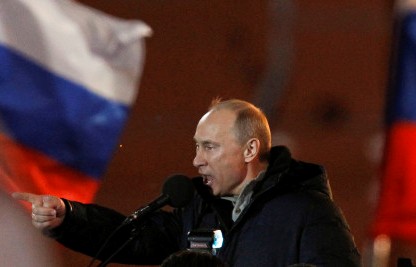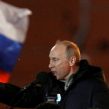
The Opposition and Putin Remain on a Collision Course
Publication: Eurasia Daily Monitor Volume: 9 Issue: 50
By:

In the first post-election week, the political landscape in Russia has remained distorted and unsettled by expectations of probable aftershocks. Vladimir Putin, who had turned his election campaign into a divisive confrontation, declared that “combat operations” were over and thanked his supporters for his victory in the “open and fair struggle” (Kommersant, March 6). The two main opposition movements – the traditional Communist party and the newly-formed League of Voters – refused to recognize Putin’s victory, and failed to characterize the elections as free, fair or honest (Interfax, Moskovskie Novosti, March 7). The space for compromise between the Kremlin’s “game over” position and the opposition’s claim that the “insult” of electoral fraud was just the end of the beginning of the non-violent revolution is for all practical intents and purposes non-existent (Nezavisimaya Gazeta, March 7). Putin was brought to tears by the well-organized jubilation of his fans, but his words about “political provocations aimed only at destroying Russian statehood and usurping power” (Lenta.ru, March 5).
The opposition staged two rallies in Moscow on March 5 and March 10, gathering each time some 20,000-25,000 people, but there is no doubt that the momentum somewhat has dissipated. The joyful street parties of December and February have shrunk to rather disheartened and even desperate meetings where safety in numbers is no longer guaranteed (New Times, March 5). The authorities are trying to emphasize this trend, so rallies in St. Petersburg, Nizhny Novgorod and other major cities were not permitted, and the hundreds of “extremists” who dared to come into the streets were forcefully dispersed (Newsru.com, March 10). The talk in the liberal-minded blogosphere is now about getting a new political act together – using the experience gained in organizing the rallies to build a “round table” of networks and interest groups (Moscow Echo, March 9). The operational aim is to register two-three (but not a dozen) new political parties that would be able to appeal to different sources of discontent – and then to challenge the legitimacy of the patently fraudulent parliamentary elections.
One of these parties has already begun forming around the remarkably successful campaign of Mikhail Prokhorov, who gained some eight percent of the vote on the official count and came in third after Communist Gennady Zyuganov with 17 percent (Moskovskie Novosti, March 6). For many voters, Prokhorov’s enormous wealth is evidence of partaking in the “stealing” of Russia’s riches; others suspect him of acting on instructions from the Kremlin, which could confiscate his assets on a whim. Yet, Prokhorov, lacking any political experience, managed to deliver a strong message for economic reforms and against bureaucratic predation (Vedomosti, March 7). His skill in forging alliances, first of all with such establishment figures as former Prime Minister Mikhail Kasyanov and former Finance Minister Alexei Kudrin, is not quite up to the task. But the high rating of his one-man-show proves that the demand for new faces on the political arena is high and growing – and that means that Putin’s act is not only stale but also entirely beatable.
The President-elect appears particularly unpopular in Moscow, which was the only region where his score – despite all the documented “irregularities” – was below 50 percent, while Prokhorov scored above 20 percent (Vedomosti, 11 March). In fact, however, Moscow is only marginally more anti-Putin than St. Petersburg, where the amount of fraudulent votes was higher, and resembled somewhat the vote tallies from many regions in the European part of Russia (but not in the North Caucasus), where United Russia gained only about a third of the vote last December (Novaya Gazeta, March 9). Putin’s propagandists put much spin on the “gap” between Moscow and the rest of the country, which is actually the result of a state-directed concentration of financial flows into the capital – where the best game in town is embezzlement by the federal bureaucracy. This class constitutes the main support base for the regime, and it is a far smaller minority than the awakened urban middle classes that have found their voice in street protests – but now have to mobilize a broader base (Ezhednevny Zhurnal, March 8). What secured the success of Putin’s campaign was the attack on the idea of “liberty” (portrayed as a malignant US-sponsored plan for an “orange revolution”) while claiming to stand for “social justice” (Russkii Zhurnal, March 7). In reality, a regime based on the dominance of a corrupt bureaucracy is profoundly anti-egalitarian, and Moscow hosts more billionaires than any other city in the world (Forbes.ru, March 7).
Putin’s majority is built on lies and archaic instincts of loyalty to the “supreme power,” which are still present in quasi-Soviet segments of Russian society. Nevertheless, these segments are dissolving as the inefficiency and irresponsibility found at every level of government become grotesque (Novaya Gazeta, March 9). The mobilization of the “working masses” against “traitors” cannot be sustained because the self-serving power-holders despise those who live on a salary while collectively engaging in evacuating their ill-gained fortunes to Western “safe havens.” The victory in the elections was secured not only by stuffing the ballot boxes but primarily by faking a “left turn” (making lavish promises of payouts from the state treasury), which Mikhail Khodorkovsky – whom President Dmitri Medvedev did not dare to pardon – has been predicting for a long time (Gazeta.ru, February 29). This smart maneuver is set to backfire as the pre-election generosity inevitably turns into post-election austerity.
The explosion of street protests in Moscow was a real scare for Putin. While now he enjoys his victory, granting concessions to those responsible for the weeks of panic would have been very much against his unforgiving nature. He believes that the weak always are – and should be – beaten, and fancies that he has proven himself to be strong. The fight on the last stretch of elections was, in his imagination, not against the cheerful crowds on the Bolotnaya square but against the dark forces that sought to dismember Russia in collusion with the eternal Western enemies. Those in the opposition who expect dialogue and liberal reforms are going to be disappointed – and will discover the depth of Putin’s vindictiveness. Paradoxical as it may seem, this revenge of Putinism could be the answer to the opposition’s search for a new energy and unity.




